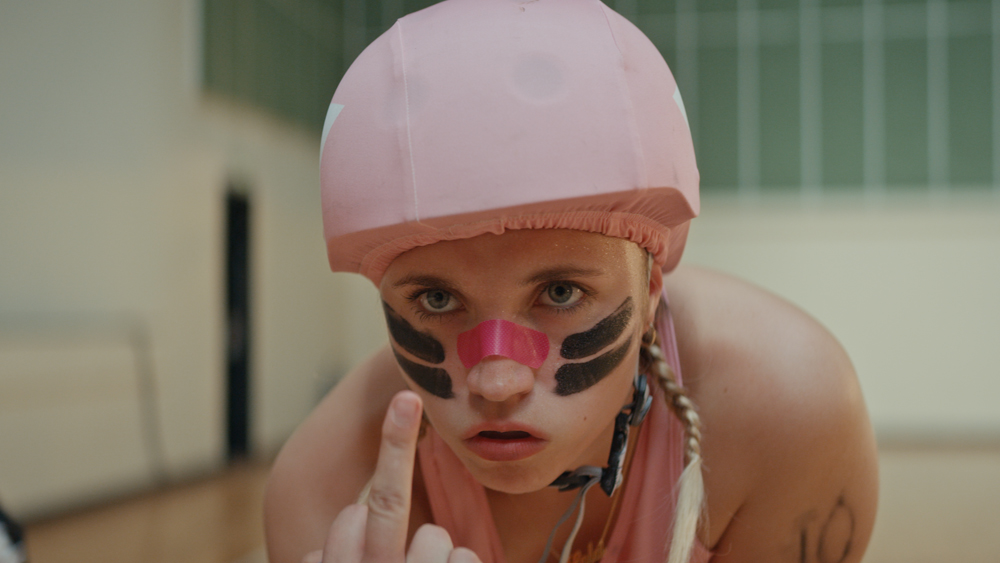Series Mania: Nikola Lange on Youth-Skewing Comedy ‘Derby Girl’
By Ben Croll
LOS ANGELES (Variety.com) –
Presented as part of Series Mania’s Coming Next from France showcase, the youth-skewing series “Derby Girl” offers a fast-paced, darkly comic portrait of a disgraced former-figure skater named Lola Bouvier (Chloé Jouannet), who is offered a shot at redemption when she joins a local roller derby league, the Cannibal Unicorns.
Sharing tonal and thematic similarities with films like “I, Tonya” and “Mean Girls,” the stylish online original will air on France Television’s streaming platform Slash later this year, with France TV Distribution handling international sales.
“It offers a new proposal when you compare it to all the standard police and crime series that you see a lot on linear channels,” says ’s Julia Schulte. “We were really interested in proposing something completely different, and with a younger target group as well.”
“As we’ve seen with ‘Sex Education’ or ‘13 Reasons Why,’ youth-focused series attract a wide-appeal, and I think we’ll see that with ‘Derby Girl’ too,” she adds.
Variety spoke with the series’ director and co-creator Nikola Lange.
What were your goals with the series?
My primary goal was to create a cool, comedic show with a strong pop sensibility. While most French shows are naturalistic, having grown up watching American and British comedies like “The Naked Gun” and “Monty Python’s Flying Circus,” I instead wanted to create something with really colorful characters.
I’m obsessed with the show’s lead character, the megalomaniac loser Lola Bouvier. I think I resemble her. Of course, I’m less of caricature than she is, but just like her, I pretend sometimes to be the best… [Even if I can also] feel really insecure. Actually, I think all artists resemble Lola in a certain way.
How would you describe the show’s themes?
I think many of the show’s themes are related to roller derby, with the most evident being that of team spirit. Lola is an individualist; she’s a selfish young woman who has to learn the value of community.
Roller derby is also about women and feminism. I didn’t want to write female characters as we are used to seeing them; I wanted to create badasses – girls who are more than just the hero’s girlfriend, girls whose decisions are not guided by romance but by the needs of everyday girls with everyday bodies. For example, when casting, we did not specify any body types, weights or ethnicities. We just wanted to create a cool group of girls with cool energy. The Pussycat Dolls are not real, but the Cannibal Unicorns are!
Personally, I feel like my biggest achievement was the fact that all of the actors spent their holidays together even after the shoot.
How did you strike the series’ comic voice? Was it a challenge to keep the character of Lola relatable/likeable while keeping her mean and comically self-centered?
I’m a huge fan of the work Jody Hill and Danny McBride. I love the character of Kenny Powers [from “Eastbound and Down”]. I think comedy comes from empathy, not sympathy. We can understand a hateful character if we have empathy for them.
Lola Bouvier is just broken. At the beginning of the show, we see the glory and decadence of her career, we understand her, what really drives her. This kept us close to the character. And yes, she can be unbearable, but in the end we come to love her.
I’m not sure about the comic voice. I have multiple influences, like the films of Edgar Wright, but also “Napoleon Dynamite,” “Hot Shots!” and more. As a young writer/director, I think I try to imitate my models, and when I fail, that becomes me, my own style.
What, in your experience, are the keys to winning over younger audiences? Do they have different expectations, different senses of humor?
I don’t think humor is generational. Comedy is not governed by trends.
What has changed, however, is the way you reach your audience. Nowadays with Netflix et al, the amount of content is immense. Sometimes, I can’t even choose what to watch. There is so much choice, so I turn to a film I’ve seen 30 times!
What’s more, binge watching has changed production. Nowadays, comedy has become a commercial tool. I also think that the traditions of stand up are very different in France than in the U.S., which I think is due to our relationship with efficiency. In stand up comedy, every joke must count: It’s set-up – punchline – laugh.
If humor has many facets nowadays, the essence of laughter remains the same. This is why “Monty Python” is still relevant, and can be just as funny as any meme on Twitter. That’s the power of comedy.

